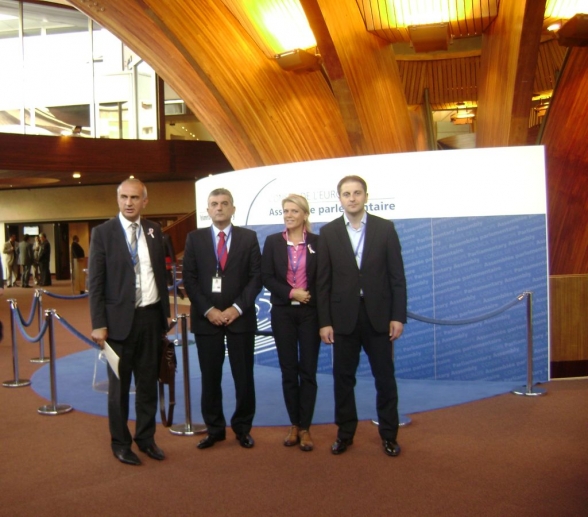At today’s plenary session, the members of the Parliamentary Assembly of the Council of Europe considered the reports on the following topics: “National security and access to information”, “The functioning of democratic institutions in Bosnia and Herzegovina”, and “Report on the honouring of obligations and commitments by the Republic of Moldova”.
It is pointed out in the Resolution 1954 (2013) and Recommendation 2024 (2013), adopted on the grounds of the Report on national security and access to information, that there can be legitimate, well defined and valid reasons to deny access to information in possession of the state authorities, however the level of secrecy must be applied within reasonable limits. Crimes such as murder, torture, forced disappearances and abductions committed by public officials do not deserve to be protected as the “state secret”. Access to information should be granted if the public interest to access certain information is greater than the interest of the government to keep that information secret. Additionally, it is pointed out that persons, who keep state secrets which are in the interest of the state, should be protected from retaliation, under condition that they were acting in good faith and in accordance with the prescribed procedures. The author of the Report on national security and access to information Mr Arcadio Díaz Tejera stated that Wikileaks discoveries had not caused any serious diplomatic repercussions or permanent damage, but one of the messages of this “leak” of information was that even publishing of relatively sensitive information might not be as damaging as previously considered. In the Resolution, the Assembly calls for the governments of the Council of Europe member states to harmonise their laws with a series of global principles that regulate this field, as well as to sign and ratify the Council of Europe Convention on Access to Official Documents.
In Recommendation adopted on the grounds of the Report on the functioning of democratic institutions in Bosnia and Herzegovina, the PACE called for all political actors in Bosnia and Herzegovina to do everything possible so that, by the end of 2013, the country could meet the conditions resulting from the ruling Sejdić and Finci. Simultaneously, the PACE requested the Committee of Ministers to call for the authorities and political leaders of Bosnia and Herzegovina to, without delay, amend the Constitution and the Law on Elections to comply with that ruling. The Assembly has expressed deep concerns regarding the current political crisis which had followed after the dissolution of the coalition of six parties at the state level, in May 2012, and pointed out the fact that new coalition partners had not yet managed to reorganise the government at the federal level, so that the government remained completely paralysed and dysfunctional. In order to end constant deadlocks and conflicts, the PACE again called for the authorities of Bosnia and Herzegovina and the key political actors to assume responsibility and to work more constructively at the state level. It was pointed out that the Assembly would be carefully monitoring the situation in Bosnia and Herzegovina, and unless some progress was made by the end of September 2014, they would decide at their next Autumn Session on what necessary measures and activities to undertake with regards to this country.
The Parliamentary Assembly of the Council of Europe decided today to continue monitoring of the Republic of Moldova, while considering the possibility of shifting to post-monitoring dialogue if the expected reforms were conducted. It is stated in the Resolution adopted on the grounds of the Report on the honouring of obligations and commitments by the Republic of Moldova that the Assembly had recognised the progress of Moldova, and constant activities with a view to meeting recommendations and standards of the Council of Europe, but it was also pointed out that this country should continue to address some fundamental issues. The PACE parliamentarians called for all the political actors in that country to respect the political culture that should be focused on the division of powers, observation of control and balance of authority, de-politicisation of the state institutions and enforcement of laws, but also on promotion of human rights and anti-discrimination.
During the day, the members of PACE were addressed by the President of Armenia, Mr Serzh Sargsyan and the Secretary General of the Council of Europe, Mr Thorbjørn Jagland.
The President of Armenia pointed out that Armenia had made great effort to build a modern state. Numerous reforms had been implemented in accordance with the recommendations of the Parliamentary Assembly of the Council of Europe, most notably those relating to organising of free, fair, and democratic elections, establishment of the independent judiciary system, ensuring equality for everyone before the law, as well as creation of conditions for mutual tolerance and trust. He concluded his speech with a reminder on significance of building bridges between peoples, cultures, and religions, as well as the crucial role of the Council of Europe in that regard.
During the day the meetings of the Committee on Social Affairs, Health and Sustainable Development and the Committee on Migration, Refugees and Displaced Persons were held, as well as the meeting of the Socialist Group, where the members of Delegation of the Parliament of Montenegro to the Parliamentary Assembly of the Council of Europe also participated.
On the fourth working day, the Parliamentary Assembly of the Council of Europe will have a discussion on the following topics that were urgently included in the agenda: “The situation in Syria”, and “the Programmes of the European Union and the Council of Europe in the field of human rights – synergy, not doubling”.
Additionally, the parliamentarians will be addressed by the President of Serbia Mr Tomislav Nikolić.
Delegation of the Parliament of Montenegro participating in the work of the Parliamentary Assembly of the Council of Europe consists of: Head of the Delegation Mr Zoran Vukčević, PhD and members of the Delegation Ms Draginja Vuksanović, PhD, Mr Mladen Bojanić, Mr Predrag Sekulić, PhD, Mr Damir Šehović, MA and Ms Snežana Jonica.








